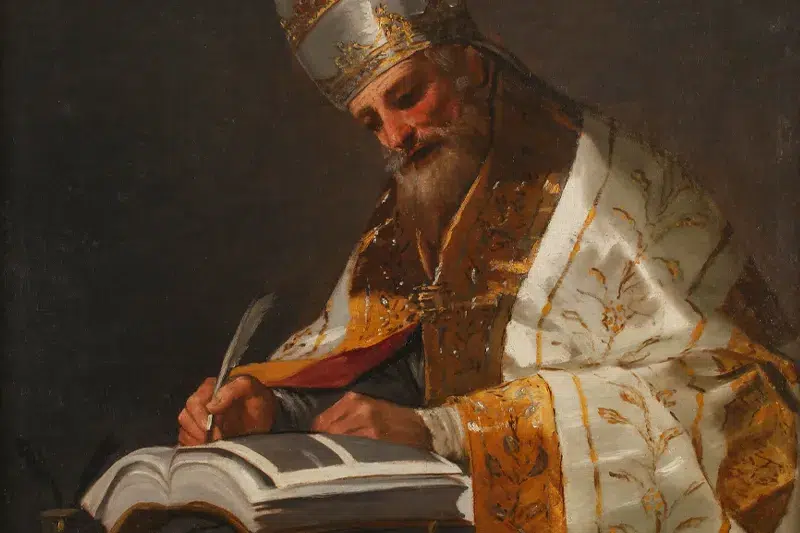
St. Gregory the Great was a reformer of the liturgy, promoter of Gregorian chant, defender of the poor and promoter of evangelization, his pontificate marked a before and after in history. His life reminds us that true greatness lies in serving God and others with generous love.
Throughout its history, the Catholic Church has had extraordinary figures who, in moments of crisis and darkness, have known how to guide the Christian people with wisdom, humility and fortitude. One of these providential men was St. Gregory the Great (540-604), Pope between 590 and 604, considered one of the four great Fathers of the Latin Church. His pontificate left an indelible mark on the liturgy, the evangelizing mission and the organization of the Church.
St. Gregory is remembered as "the pope who ruled with a monk's heart".because, in spite of assuming the weight of the headquarters of Rome in a turbulent time, he always maintained the spirit of service and humility that he had cultivated in his monastic life.
His figure continues to be a current example for pastors and faithful, because he knew how to combine firmness of government with a deep interior life, personal austerity with great generosity towards the poor, and tradition with openness to the needs of his time.
In this blog story we will delve into his life, his historical context, his main works and why the Church venerates him as a saint and Doctor of the Church.
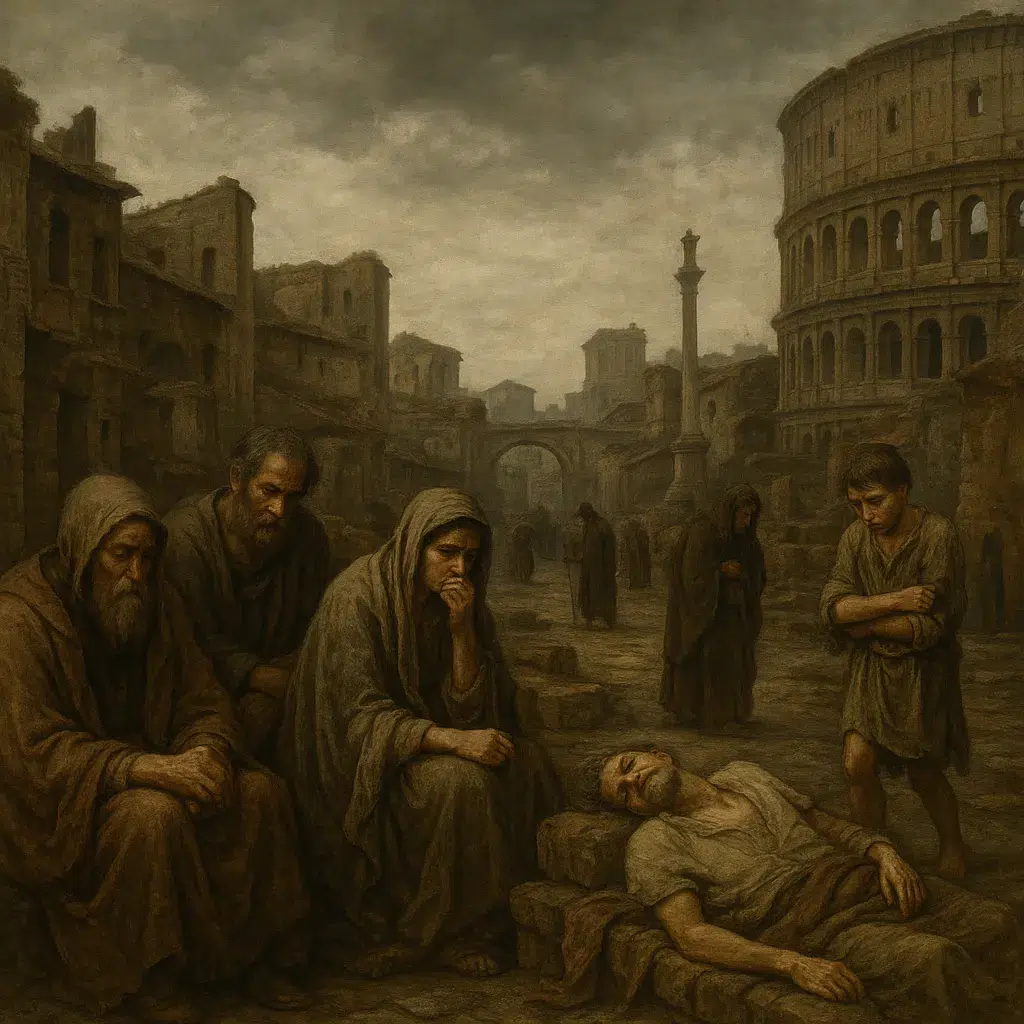
St. Gregory was born in Rome around 540, into an aristocratic family of ancient senatorial tradition. The city where he was born was far from its former imperial splendor: after the fall of the Western Roman Empire (476), Rome had been reduced to a decadent place, stricken by wars, epidemics and poverty.
The western world was fragmented and under pressure from peoples, such as the Lombards, who had invaded Italy and constantly threatened the city of Rome. The political authority was weak and the only stable reference point for the people was the Church and the Pope.
This context of crisis was decisive in understanding the figure of Gregory: a man who, without seeking it, had to assume the burden of guiding not only the spiritual life, but also the material survival of an entire people.
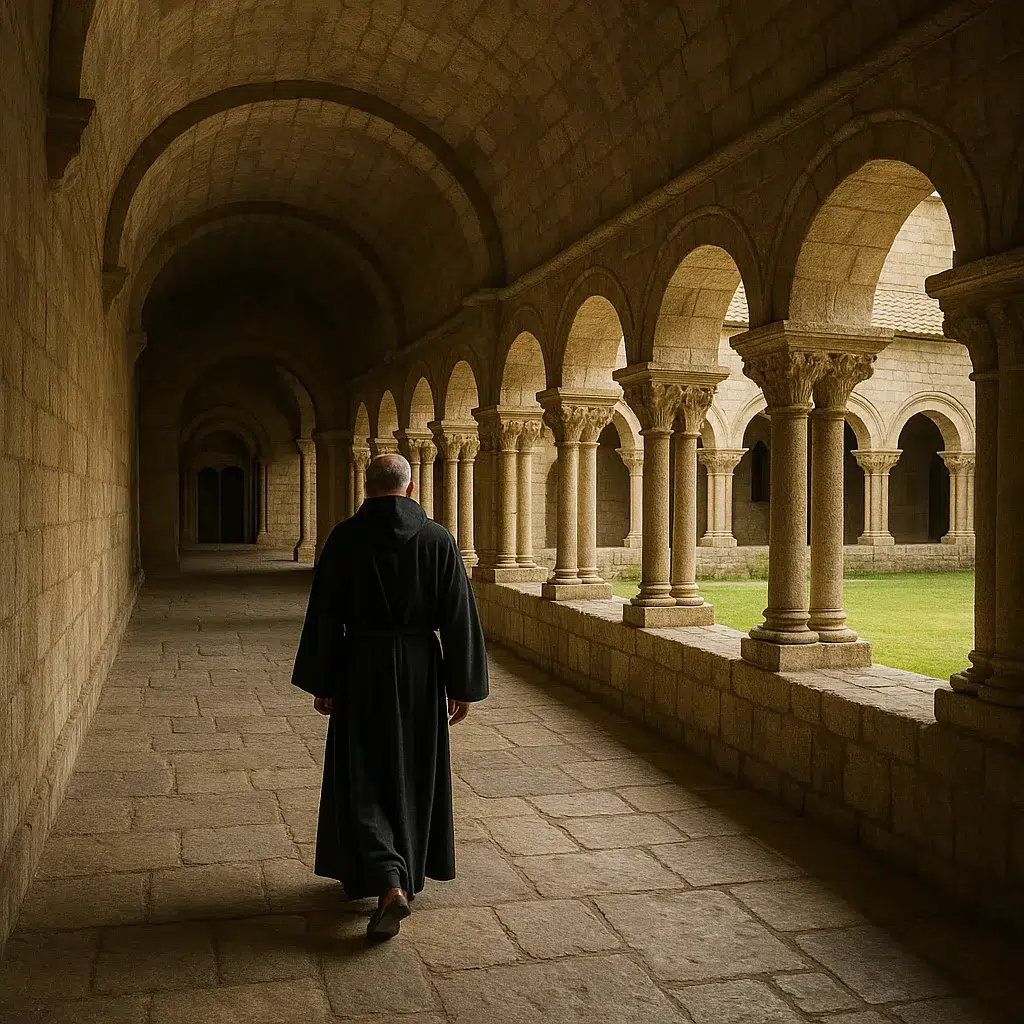
Gregorio received a refined education befitting his social rank. He was trained in Law, Literature and Administration, which allowed him to occupy positions of great responsibility. Around the year 572 he became prefect of RomeThe city's highest civil authority.
However, after the death of his father, Gregory decided to make a radical change in his life. He sold much of his possessions to help the poor and transformed his house on Mount Celio into a Benedictine monastery. He himself retired there as a monk, leading a life of prayer, study and austerity.
His monastic vocation was always the center of his identity, and although obedience later led him to leave this contemplative life, Gregory never ceased to consider himself a simple "servant of the servants of God," a title he introduced and which is still used today by the Popes as a sign of humility.
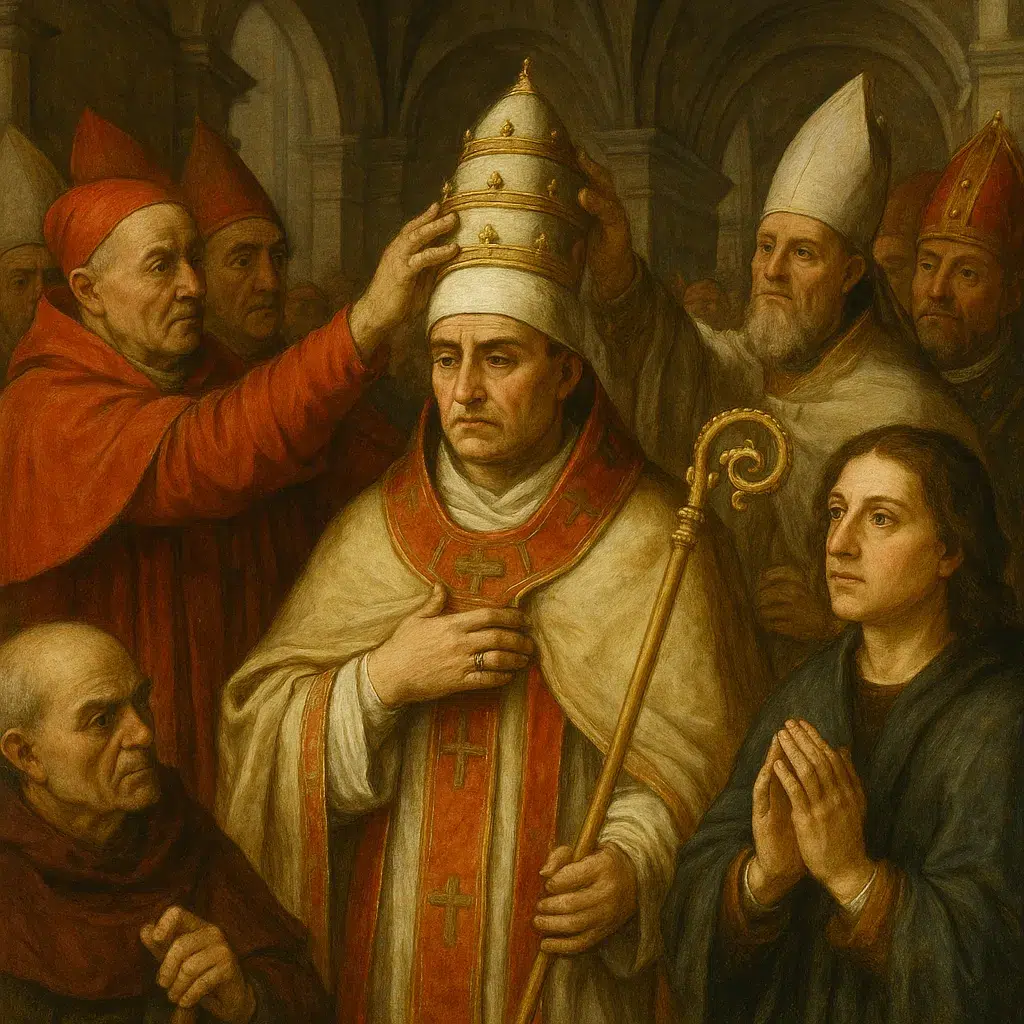
In the year 590, after the death of Pope Pelagius II, Gregory was elected as successor of St. Peter. The choice was not easy: Gregory tried to resist, even asking the emperor not to confirm his appointment, as he felt he was not prepared for the enormous burden. However, the Roman people acclaimed him and he finally accepted the Petrine ministry.
His pontificate began in the midst of a terrible plague that was ravaging Rome. Tradition has it that he organized penitential processions and processions of supplication to the Virgin, in which, on arriving at Hadrian's mausoleum, he had a vision of the archangel Michael sheathing his sword, a sign that the plague was coming to an end. From then on, that place was called Castel Sant'Angelo.
St. Gregory ruled the Church for 14 years, until his death in 604. His work can be summarized as:
One of the best known legacies of Gregory the Great is the consolidation of the Roman liturgy. He gave unity to the rites, promoted clarity in the prayers and set norms for the celebration of Mass and chant in the liturgy.
Although he did not invent Gregorian chant, he did promote and organize it, so that the musical tradition of the Western Church was linked to his name. Gregorian chant became a universal expression of prayer and beauty that is still alive today in monasteries and temples around the world.
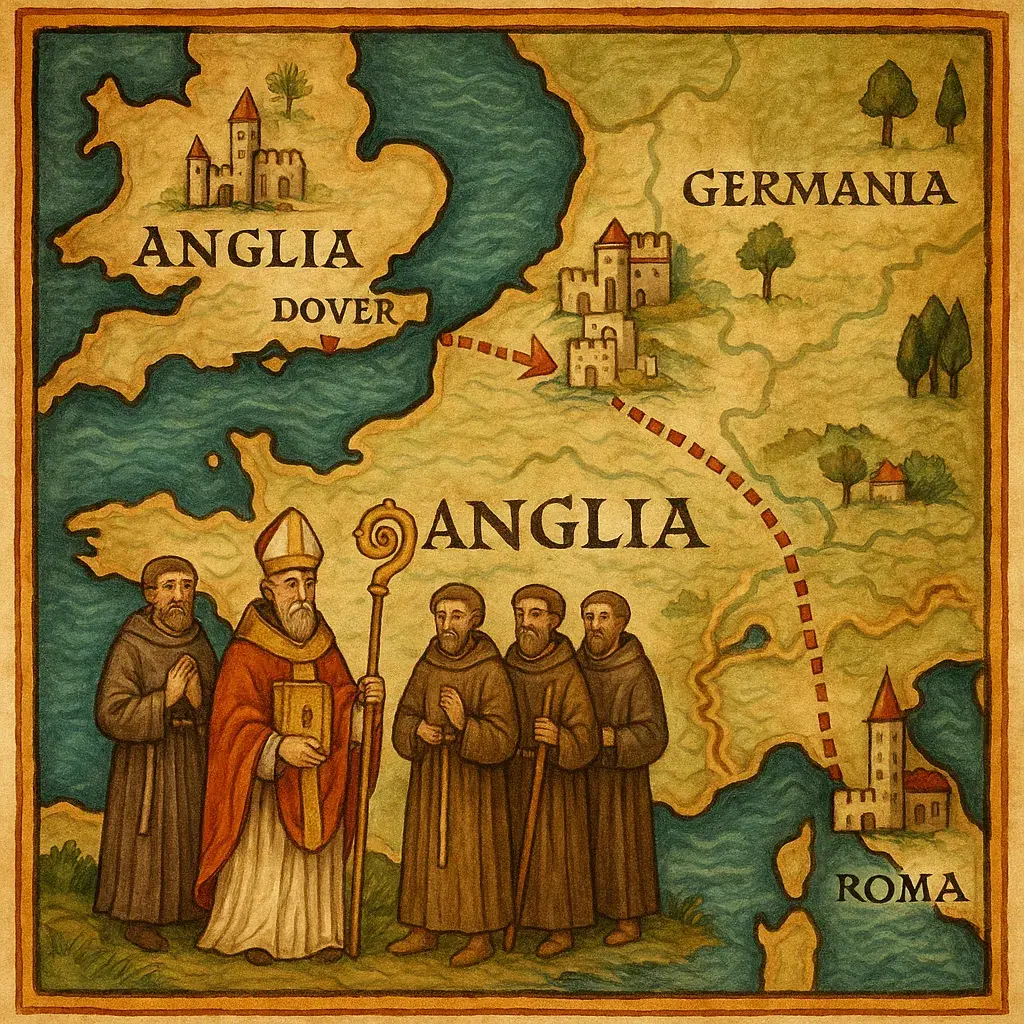
Gregory understood that the Gospel had to reach all peoples. He sent missionaries from Rome, the most famous case being that of saint Augustine of Canterburywho brought the Christian faith to the Anglo-Saxon peoples in England. Thanks to this initiative, the English Church became in a few centuries a focus of evangelization for the whole of Europe.
With this missionary impulse, Gregory reinforced the universality of the Church and laid the foundations for the Christianization of medieval Europe.
If anything characterized Gregory, it was his closeness to the poorest. The Roman Church, under his government, became the main institution of assistance to the needy. He organized a system of distribution of food and aid, administering with great rigor the ecclesiastical goods to put them at the service of the people.
His example of personal austerity was clear: while he ruled firmly, he lived simply, aware that his mission was to serve.
St. Gregory was a prolific and clear writer. His works were widely disseminated and marked the spirituality of the Middle Ages. Among them are:
The Pastoral Rule: a manual for bishops and pastors on how to exercise their ministry with humility and zeal. It was so influential that Charlemagne had it distributed to all the bishops of his empire.
Dialogues: where he narrates the lives of Italian saints, especially St. Benedict of Nursia, whose spirituality he deeply admired.
Homilies on Ezekiel and on the Gospels: with clear and practical teachings for the Christian life.
His theology, more pastoral than speculative, stood out for its ability to unite doctrine with life, wisdom with closeness.
Gregory was not only a spiritual leader, he also had to serve as an administrator and diplomat in a devastated Italy. He negotiated directly with the Lombards, reaching peace agreements that saved lives and protected the city of Rome.
He also strengthened the organization of the Church, sending letters and directives to bishops all over the world. We have preserved more than 800 of his letters, which allow us to see his enormous activity and pastoral care.
St. Gregory died on March 12, 604, exhausted by illness and incessant work. He was buried in St. Peter's Basilica, where his tomb is still venerated.
The people proclaimed him a saint almost immediately. His reputation for holiness was due to his austere life, his love for the poor, his fidelity to prayer and his zeal for the Church. In 1295, Pope Boniface VIII declared him a saint. Doctor of the Churchrecognizing the depth of his spiritual teaching.
Today he is remembered as St. Gregory the GreatThe title he shares with only a few Popes in history, such as St. Leo the Great.
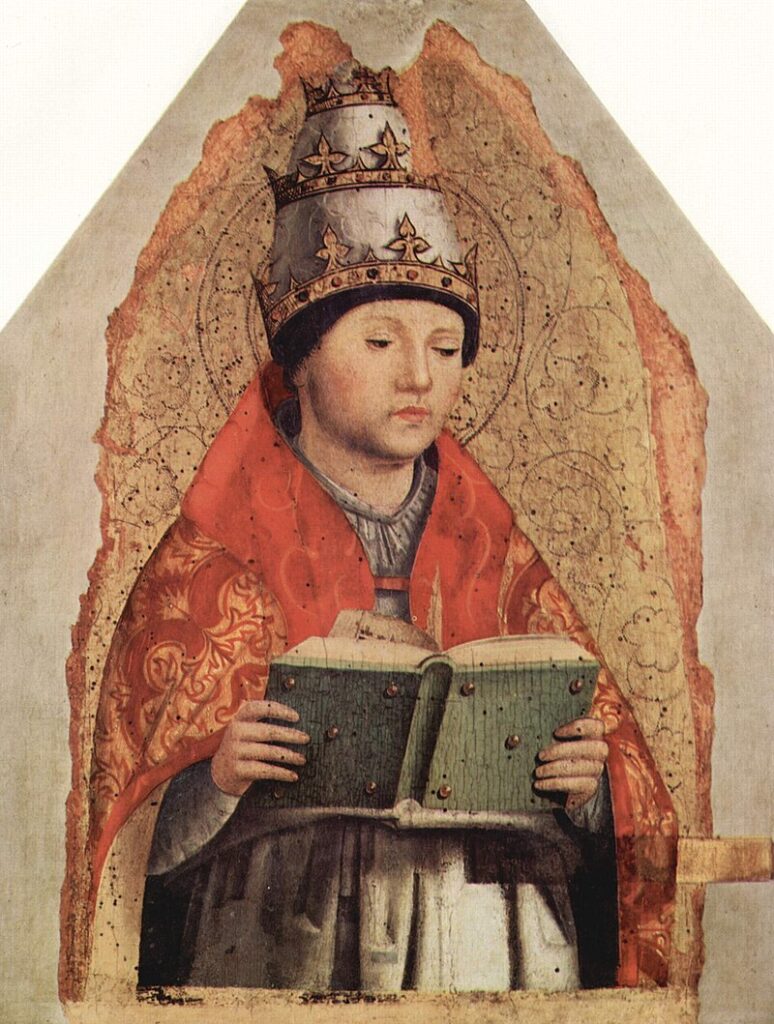
Although more than 1,400 years have passed since his death, the figure of St. Gregory is still very relevant for the Church and for the world:
St. Gregory the Great was an exceptional Pope who knew how to lead the Church in times of crisis, not from power, but from humility and service. His life demonstrates that holiness does not consist in doing extraordinary things, but in living with fidelity and dedication the responsibilities that God places in our hands on a daily basis.
The Church venerates him as a saint and doctor because he united the prayer of the monk, the wisdom of the teacher and the fortitude of the pastor. His example continues to inspire Christians today to be light in the midst of darkness, humble servants of others and faithful messengers of the Gospel.
As he wrote in his Pastoral Rule: "He who has been placed as pastor must be, above all, an example of life, so that his very conduct may be a point of reference for others."
St. Gregory the Great teaches us that true greatness is in the magna caritasin the great and generous love that gives itself without measure.